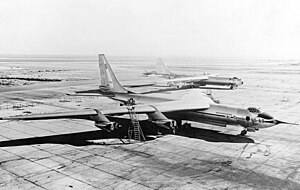Convair YB-60
| YB-60 | |
|---|---|

| |
| YB-60 prototype, Convair B-36F-5 is in the background. | |
| Role | Strategic bomber |
| Manufacturer | Convair |
| First flight | 18 April 1952 |
| Status | Canceled 14 August 1952 |
| Number built | 2 |
| Developed from | Convair B-36 |
The Convair YB-60 was an American experimental bomber prototype for the United States Air Force canceled on 14 August 1952.
Design and development
On 25 August 1950, Convair issued a formal proposal for a swept-winged version of the B-36 with all-jet propulsion. The United States Air Force was sufficiently interested that on 15 March 1951, the USAF authorized Convair to convert two B-36Fs (49-2676 and 49-2684) as B-36Gs. Since the aircraft was so radically different from the existing B-36, the designation was soon changed to YB-60.
The YB-60 betrayed its 72% parts commonality with its piston-engined predecessor. The fuselages of the two aircraft were largely identical, although the YB-60 had a longer, pointed nose with a needle-like instrument probe, instead of the B-36's rounded nose, and the tail surfaces were all new, swept to match the wings, instead of the B-36's more antiquated design. The swept wings used a lot of B-36 parts, with a wedge-shaped insert at the wing root to sweep the wings back more than the B-36's wings.
The YB-60's unofficial competitor for an Air Force contract was Boeing's B-52 Stratofortress. Convair's proposal was substantially cheaper than Boeing's since it involved modifying an existing design rather than starting from scratch. Like the B-52, it was powered by eight Pratt & Whitney J57-P-3 turbojets mounted in pairs in four pods suspended below the wing.
Instead of the B-36's crew of fifteen, the YB-60's crew numbered only 10. Production B-60s were to have similar defensive armament to the B-36.
Convair YB-60 serial number 49-2676 made its maiden flight on 18 April 1952, piloted by Beryl Erickson. The Convair aircraft beat the Boeing YB-52 into the air by three days, but it was soon obvious that it would win few other contests against Boeing's bomber. The YB-60 was approximately 100 mph (160 km/h) slower than the YB-52 and also had severe handling problems. It did carry a heavier bomb load - 72,000 pounds against 43,000 pounds (20 t) for the YB-52 - but the Air Force did not see the need for the extra capacity given the YB-60's other drawbacks. (Later "big belly" modifications increased the B-52's bomb load to 60,000 lbs)
Accordingly, the flight test program was canceled on 20 January 1953 with 66 flying hours accumulated, and a second prototype never completed. The airframe was built, but it was not fitted with engines or much other equipment. Since Convair had completed its prototype contract satisfactorily, both the YB-60s were formally accepted by the Air Force in 1954. The operational aircraft never flew again, and both airframes were scrapped by July.
Specifications (YB-60)

General characteristics
- Crew: 5
Performance
- Thrust/weight: 0.44
Armament
See also
Related development
Aircraft of comparable role, configuration, and era
Related lists
References
- Jacobsen, Meyers K. and Wagner, Ray. B-36 in Action (Aircraft in Action No.42). Carrollton, TX: Squadron/Signal Publications, Inc., 1980. ISBN 0-89747-101-6.
- Jones, L.S. U.S. Bombers, B-1 1928 to B-1 1980s. Fallbrook, CA: Aero Publishers, Inc., 1962 (second edition 1974). ISBN 0-8168-9126-5.
